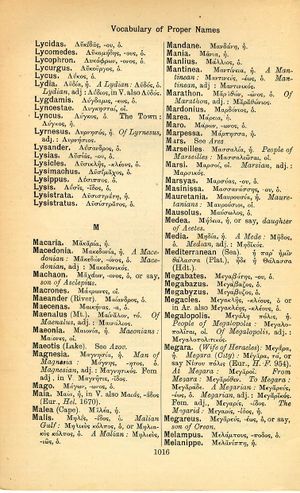Lycophron: Difference between revisions
Μισθὸς διδάσκει γράμματ', οὐ διδάσκαλος → Pretium docet te, non praeceptor, litteras → Der Lehrer lehrt das Lesen nicht, es ist der Lohn
m (Text replacement - "}}]]" to "}}]]") |
m (Text replacement - "(|thumb)\n(\|link=)" to "$1$2") |
||
| Line 1: | Line 1: | ||
{{WoodhouseENELnames | {{WoodhouseENELnames | ||
|Text=[[File:woodhouse_1016.jpg|thumb | |Text=[[File:woodhouse_1016.jpg|thumb|link={{filepath:woodhouse_1016.jpg}}]]Λυκόφρων, -ονος, ὁ. | ||
|link={{filepath:woodhouse_1016.jpg}}]]Λυκόφρων, -ονος, ὁ. | |||
}} | }} | ||
{{Lewis | {{Lewis | ||
Revision as of 16:50, 18 May 2020
English > Greek (Woodhouse)
Λυκόφρων, -ονος, ὁ.
Latin > English (Lewis & Short)
Lycŏphron: ŏnis, m., = Λυκόφρων,
I Lycophron of Chalcis, in Eubœa, the author of Cassandra, an Alexandrine grammarian and tragedian of the time of Ptolemy Philadelphus: utque cothurnatum periisse Lycophrona narrant, Ov. Ib. 531: latebrae Lycophronis atri, so called from his obscure style, Stat. S. 5, 3, 157.
Latin > French (Gaffiot 2016)
Lўcŏphrōn, ŏnis, m. (Λυκόφρων), poète tragique de Chalcis, célèbre par l’obscurité de son style : Stat. S. 5, 3, 157 ; Ov. Ib. 531.
Latin > German (Georges)
Lycophrōn, phronis, Akk. phrona, m. (Λυκόφρων), ein griechischer Tragödiendichter aus Chalcis auf Euböa, Ov. Ib. 531: latebrae Lycophronis atri, wegen seiner dunklen Schreibart, Stat. silv. 5, 3, 157.

